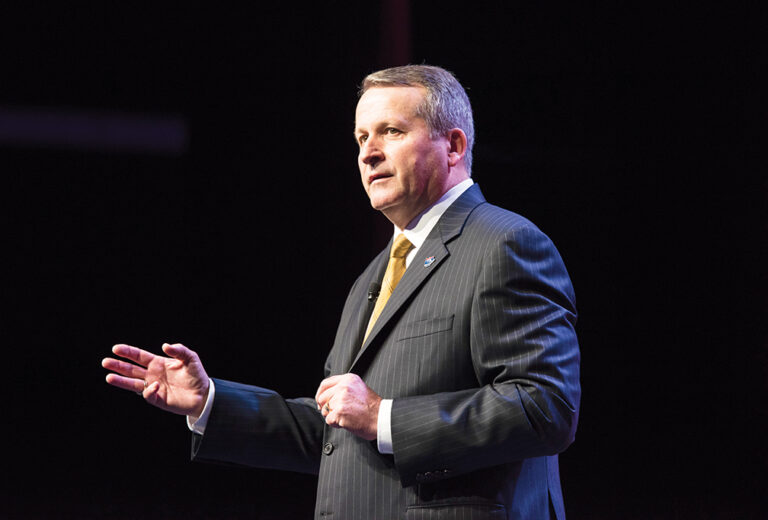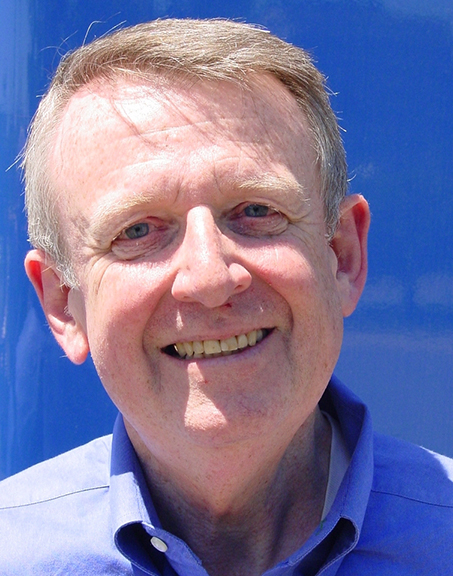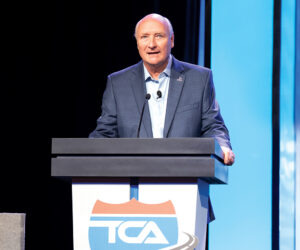On December 21, 2015, John Lyboldt became president of the Truckload Carriers Association (TCA). He hit the ground running the very next day, polling the membership to determine what was on their minds regarding the future of the association. Over 300 responses later, he knew what needed to be done and went to work on four themes he heard over and over again — to improve the members’ balance sheet, to improve the members’ profitability, to improve the members’ retention of their skilled workforce, and to be the voice of truckload through government affairs. Under Lyboldt’s leadership, TCA has been extremely successful in these four areas, in addition to many, many more. Last year, Lyboldt announced he would retire in March 2022. Recently, he sat down with Truckload Authority to share his recollections of his 36 years in the automotive industry, including the past five years as president of TCA.
What first attracted you to the automotive industry?
I was a Dale Carnegie employee and was working with an automotive group. The dealer offered me a position, and I took it. My grandfather and my uncle were Chevrolet Buick dealers just outside of Syracuse, New York. I had thoughts about the possibility of becoming the next dealer principal when they retired as a long-term strategy.
I know you were a senior vice president at the National Automotive Dealers Association when you went to work at the Truckload Carriers Association. How did you hear about the job coming open?
I found the position on ASAE. I pulled three years of TCA’s 990s, and I interviewed a retired employee of TCA to learn as much as I could about the association before I even applied. I had done a lot of research on the association to see what it was about and how they were doing. Looking at the 990s, I knew where the expense lines were and what kind of revenue they were generating. In doing so, I had a really good feel for TCA and the opportunity. So, I decided to apply because I felt I could really make a difference from what I had learned.
For the eight years before coming to TCA, you served as senior vice president of dealer services for the National Automobile Dealers Association (NADA), an organization that represents franchised new car and truck dealers, their managers, and their employees. Before that, you spent 17 years as the president and CEO of the Rochester Automobile Dealers Association (RADA) in Rochester, New York. How did your previous work prepare you for what you encountered at TCA?
I took over at age 29 as president of RADA. It was a good-size organization with 21 employees. I cut my teeth and faced some surmountable challenges at RADA that shaped my skill sets, leadership strength, and future. I’ve always worked closely with independently family-owned businesses. There, I was engaged in lobbying at both state and federal levels, as well as a complete offering of products and services. I was recruited by the National Automobile Dealers Association to move to Washington in 2007. The reason I was recruited is I had gone through the chairs of the state and metro automotive association organization at NADA called the Automotive Trade Association Executives (ATAE). ATAE represents more than 100 state and metro associations who represent 20,000 dealers. With the exposure to NADA, they asked me if I’d be interested in coming to Washington to work for NADA in the dealership operations, which includes the Academy, 20 group, and NADA membership. When I looked at TCA, I saw my experience and knowledge as being important to the initiatives of TCA.
What were your early impressions of TCA?
I saw opportunity. I started on December 21, 2015, and on December 22, I sent a letter to the membership. I remember Keith Tuttle, TCA Chairman, when he read the letter asking the membership what was on their mind regarding TCA’s future, he commented to me he liked I was jumping in the deep end of the pool already. I received roughly 300 emails, phone calls, and letters from the membership. Next, I organized into four different “buckets” the major themes, and that’s where the four legs of a four-legged stool was created.
Let’s just talk about the four-legged stool. How did it help shape the association during those first years?
It gave direction. It was something we could use to improve the members’ balance sheet, improve their profitability, help them retain their skilled workforce, and become the voice of truckload through government affairs. Today, those still exist. Additionally, I suggested to leadership that we have what we call a leadership transition meeting every year before the new chairman takes over. Usually it’s December, but this year it’s going to be January. This created an opportunity for us to review what we had accomplished based on the objectives and goals for the previous year, what we didn’t accomplish that would be carried over, and what are the vision and goals of the incoming chairman. We tweaked the plan when a new chairman came in, and with the next chairman, tweaked it again. I have a rule, and that is as soon as you think your association is perfect, you are three years behind. We didn’t use any big company guru to tell us what to do. The membership knew best, and they told us what we needed to do.
Of the four legs, what did membership say was the most urgent?
Most urgent was providing membership with TCA’s direction and executing on it. There were many moving pieces; however, we rebuilt TCA on sustainability of our programs and services. We needed to be strategic and extremely focused, and this still exists today.
Has the growth of TCA surprised you?
Not at all. We knew if you provided membership what they want, need, and will use, it would produce incredible results. If you combine this with membership engagement and involvement, you have a winning formula. Members make the association what it is!
I know the stool was a key strategy early on. What are some of the other strategies you’ve used to sustain the growth of the association?
Like I said previously, member engagement is the key to success. Dues make it all work; however, dues alone will not don’t grow membership. What grows membership is engagement and the membership value proposition. We have a committed officer group, executive committee, board, and hardworking committees who provide more than direction. They are the core of what we are and what we do. Nonmembers are beginning to see what they are missing out on and are saying, “We want to be part of this plan.”
When you are out and about, what do you hear from membership about the value TCA brings, and what of those brings them the most value?
TCA is the only trade association whose sole focus is the truckload segment of the motor carrier industry, and we take this very seriously. They like that we are providing leadership that will increase their productivity, profitability, and ability to provide superior service, to advocate on behalf of our members, and to enhance the truckload industry’s ability to provide safe, high-quality, reliable truckload transportation services to the shipping public.
You’ve always surrounded yourself with hardworking, dedicated, loyal people, including the staff and board. Speak about the role they’ve played during your time at TCA.
I always like to say it this way: They all make me look good. And you know, when you can bring out the best in people, that is the key to leadership. And I can tell you the leadership I’m under with my officer group, they absolutely bring the best out of me. I think the membership brings the best out of me. And in turn, I bring the best out of the staff.
I am extremely lucky I’ve had the group of people around me that I do, but it doesn’t come by happenstance. It comes with a lot of hard work by people who can get the job done and who are accountable. I think the accountability level here has gone through the roof and that each person owns what they do. And they’re proud of what they do. They’re proud of the fact that if they come in and they contribute the way that they want to contribute, that their work is very important and that they can be satisfied with their careers. And I think that’s true with just about anybody.
You know, if you provide an opportunity and you give people the tools and the resources and the guidance and let them go with it, they will be successful. And that’s what you see here at TCA. The TCA staff is, I believe, the strongest that I’ve seen in the time I’ve been here. This group of people is hard-charging. They want to do it right. They want to make sure the membership experience is at an all-time high. They want to deliver white-glove service. The reality is that everyone must be a team player, and no one team member can be successful without the other. So, the culture and the climate we have here is that we’re in this together. Let’s figure out how we can make this thing really, really sing. And then let’s go get the job done.
In your president’s address at the 2020 TCA convention, you used the phrase “once upon a time” to reflect what the association had been when you took over, but there is still a lot of work to be done. So, why are you stepping away?
I am blessed to have been married 44 years to my wife Lynne. I have two incredibly successful children, Kelly and Andrew, and an incredible daughter-in-law, Sara, and three beautiful grandkids, Madison, Makayla, and Keller. My wife and I aren’t getting any younger, and I want to be able to enjoy my family while my health is still good. That’s the real reason I’m retiring.
What will you miss the most?
My relationships. I have made life lifelong friends. So, what I’ll miss the most is the interaction with people. And quite frankly, it’s a challenge for me. That’s something I need to figure out.
What are your plans for retirement?
At this point, I really haven’t put together a plan. I think the important thing to do is get to that point, because we have so much going on. When I retire, we are going to take the month of April and half of May to spend on Kiawah Island. We own a place in Kiawah and will take those weeks to think this through a little bit, and go from there. I am keeping my options open. I don’t have any aspirations to travel. Lynne and I have traveled extensively. I’m just going to spend time with my family.
As you leave the office for the last time, if you could turn around and say one thing to the staff, what would it be?
It has been a pleasure, and I wish you the best of luck.
Lyndon Finney’s publishing career spans over 55 years beginning with a reporter position with the Southwest Times Record in Fort Smith, Arkansas, in 1965. Since then he’s been a newspaper editor at the Southwest Times Record, served five years as assistant managing editor of the Arkansas Democrat-Gazette in Little Rock and from November 2004 through December 2019 served as editor of The Trucker. Between newspaper jobs he spent 14 years as director of communications at Baptist Health, Arkansas’ largest healthcare system. In addition to his publishing career he served for 46 years as organist at Little Rock’s largest Baptist church.











